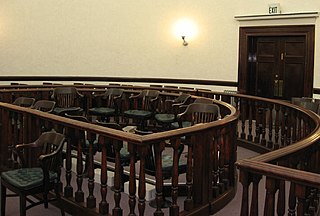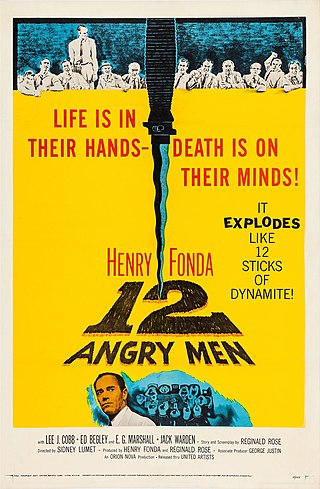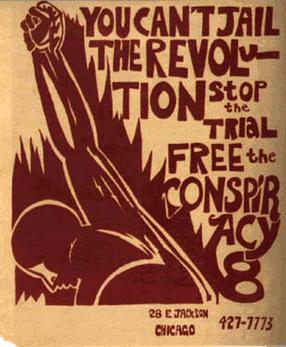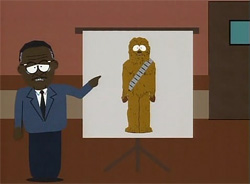Trial by Jury is an 1875 comic opera in one act, with music by Arthur Sullivan and libretto by W. S. Gilbert.
Contents
Trial by Jury may also refer to:
Trial by Jury is an 1875 comic opera in one act, with music by Arthur Sullivan and libretto by W. S. Gilbert.
Trial by Jury may also refer to:

A jury is a sworn body of people (jurors) convened to hear evidence, make findings of fact, and render an impartial verdict officially submitted to them by a court, or to set a penalty or judgment.

Legal drama is a genre of film and television that generally focuses on narratives regarding legal practice and the justice system. The American Film Institute (AFI) defines "courtroom drama" as a genre of film in which a system of justice plays a critical role in the film's narrative. Legal dramas have also followed the lives of the fictional attorneys, defendants, plaintiffs, or other persons related to the practice of law present in television show or film. Legal drama is distinct from police crime drama or detective fiction, which typically focus on police officers or detectives investigating and solving crimes. The focal point of legal dramas, more often, are events occurring within a courtroom, but may include any phases of legal procedure, such as jury deliberations or work done at law firms. Some legal dramas fictionalize real cases that have been litigated, such as the play-turned-movie, Inherit the Wind, which fictionalized the Scopes Monkey Trial. As a genre, the term "legal drama" is typically applied to television shows and films, whereas legal thrillers typically refer to novels and plays.
A trial is the presentation of information in a formal setting, usually a court.
Law and Order may refer to:

12 Angry Men is a 1957 American independent legal drama film directed by Sidney Lumet in his feature film debut, adapted from a 1954 teleplay of the same name by Reginald Rose. The film tells the story of a jury of 12 men as they deliberate the conviction or acquittal of a teenager charged with murder on the basis of reasonable doubt; disagreement and conflict among the jurors forces them to question their morals and values. It stars Henry Fonda, Lee J. Cobb, Ed Begley, E. G. Marshall, and Jack Warden.

Clarence Seward Darrow was an American lawyer who became famous in the 19th century for high profile representations of trade union causes, and in the 20th century for several criminal matters, including the Leopold and Loeb murder trial, the Scopes "monkey" trial, and the Ossian Sweet defense. He was a leading member of the American Civil Liberties Union and a prominent advocate for Georgist economic reform. Darrow was also well known as a public speaker, debater, and writer.
Jury nullification, also known in the United Kingdom as jury equity or a perverse verdict, is when the jury in a criminal trial gives a verdict of not guilty even though they think a defendant has broken the law. The jury's reasons may include the belief that the law itself is unjust, that the prosecutor has misapplied the law in the defendant's case, that the punishment for breaking the law is too harsh, or general frustrations with the criminal justice system. Some juries have also refused to convict due to their own prejudices in favor of the defendant. Such verdicts are possible because a jury has an absolute right to return any verdict it chooses.

The Chicago Seven, originally the Chicago Eight and also known as the Conspiracy Eight or Conspiracy Seven, were seven defendants – Rennie Davis, David Dellinger, John Froines, Tom Hayden, Abbie Hoffman, Jerry Rubin, and Lee Weiner – charged by the United States Department of Justice with conspiracy, crossing state lines with intent to incite a riot, and other charges related to anti-Vietnam War and 1960s counterculture protests in Chicago, Illinois during the 1968 Democratic National Convention. The Chicago Eight became the Chicago Seven after the case against codefendant Bobby Seale was declared a mistrial.

In a jury trial, the Chewbacca defense is a legal strategy in which a criminal defense lawyer tries to confuse the jury rather than refute the case of the prosecutor. It is an intentional distraction or obfuscation.

The Scottsboro Boys were nine African-American male teenagers accused of raping two white women in 1931. The landmark set of legal cases from this incident dealt with racism and the right to a fair trial. The cases included a lynch mob before the suspects had been indicted, all-white juries, rushed trials, and disruptive mobs. It is commonly cited as an example of a legal injustice in the United States legal system.

Law & Order: Trial by Jury is an American legal drama television series about criminal trials set in New York City. It was the fourth series in Dick Wolf's Law & Order franchise. The show's almost exclusive focus was on the criminal trial of the accused, showing both the prosecution's and defense's preparation for trial, as well as the trial itself. The series was first announced on September 28, 2004. The series premiered on Thursday, March 3, 2005, and ended on January 21, 2006. Its regular time slot was Fridays 10/9 p.m. ET on NBC. The last episode aired on Court TV months after the series' cancellation.

Paul Edward Haggis is a Canadian screenwriter, film producer, and director of film and television. He is best known as screenwriter and producer for consecutive Best Picture Oscar winners Million Dollar Baby (2004) and Crash (2005), the latter of which he also directed. Haggis also co-wrote the war film Flags of Our Fathers (2006) and the James Bond films Casino Royale (2006) and Quantum of Solace (2008). He is the creator of the television series Due South (1994–1999) and co-creator of Walker, Texas Ranger (1993–2001), among others. Haggis is a two-time Academy Award winner, two-time Emmy Award winner, and seven-time Gemini Award winner. He also assisted in the making of "We Are the World 25 for Haiti". In November 2022, he was found liable in a civil trial which alleged he raped publicist Haleigh Breest and he was required to pay $10 million in damages.

The Jury is a British television serial broadcast in 2002. The series was the first ever to be allowed to film inside the historic Old Bailey courthouse.

René Balcer is a Canadian-American television writer, director, producer, and showrunner, as well as a photographer and documentary film-maker.
Donald Moffat was a British-American actor with a decades-long career in film and stage in the United States. He began his acting career on- and off-Broadway, which included appearances in The Wild Duck and Right You Are If You Think You Are, earning Tony Award nominations for both, as well as Painting Churches, for which he received an Obie Award. Moffat also appeared in several feature films, including The Thing (1982), The Right Stuff (1983) and, in a rare leading role on film, as a tenuously-recovering alcoholic in On the Nickel (1980). Moffat also made guest appearances in numerous television series, including such shows as Little House on the Prairie, Dr. Quinn, Medicine Woman, and The West Wing. He also was a principal in the 1993 TV miniseries Tales of the City.
Feltner v. Columbia Pictures Television, Inc., 523 U.S. 340 (1998), was a case in which the Supreme Court of the United States ruled that if there is to be an award of statutory damages in a copyright infringement case, then the opposing party has the right to demand a jury trial.

Jennifer Lynn Newsom is an American documentary filmmaker and actress who is the current First Partner of California as the wife of Governor Gavin Newsom. She is the director, writer, and producer of the film Miss Representation (2011), which premiered in the documentary competition at the Sundance Film Festival. The film examines how the media has underrepresented women in positions of power. The Mask You Live In (2015), her second film which she wrote, produced and directed, scrutinizes American society's definition of masculinity.
A court show is a broadcast programming genre comprising legal dramas and reality legal programming. Court shows present content mainly in the form of legal hearings between plaintiffs and defendants, presided over in one of two formats: scripted/improvised with an actor portraying a judge; or, an arbitration-based reality format with the case handled by an adjudicator who was formerly a judge or attorney.
A citizen's right to a trial by jury is a central feature of the United States Constitution. It is considered a fundamental principle of the American legal system.
James Foster Neal was an American trial lawyer who was best known for prosecuting labor leader Jimmy Hoffa and later top Nixon administration officials in connection with the Watergate scandal.